JACQUES PERCONTE
DIGITAL LANDSCAPES
DIGITAL LANDSCAPES
Friday 10 June
18:00—21:00
Birkbeck Cinema
43 Gordon Square
London Wc1h 0pd
→ Free : book
18:00—21:00
Birkbeck Cinema
43 Gordon Square
London Wc1h 0pd
→ Free : book
Saturday 11 June
14:00—18:30
Close-Up Cinema
97 Sclater Street
London E1 6hr
→ £6.00 - £12.00: book
14:00—18:30
Close-Up Cinema
97 Sclater Street
London E1 6hr
→ £6.00 - £12.00: book

Jacques Perconte
DIGITAL LANDSCAPES
DIGITAL LANDSCAPES
A two-day programme to present the work of Jacques Perconte, a major figure in the French digital art and avant-garde scene.
In the presence of Jacques Perconte, and the scholars Fred Brayard, Joel McKim, and Muriel Tinel-Temple.
Screenings
presentations
discussions
A rare opportunity to experience these remarkable journeys, meet an artist and discuss his singular approach to both films and the world we live in.

Jacques Perconte is a visual artist and a major figure in the French digital art and avant-garde scene since the 1990. He is very prolific and produces a variety of works: films, but also generative pieces, audiovisual performances, photographies and installations. Recently he worked on several commissions including a monumental installation for the Council of the European Union, Europaaour (2022). Perconte’s work has been focusing on landscapes for more than fifteen years. He travels to specific places, be it in France, Scotland or Madeira, and then wanders and roves around, filming and re-filming the same area, exploring the various natural elements, forest, sky, sea, birds, but also traces of human life inscribed in these territories. Then, he re-works the digital flow of video files and takes us on a journey into shapes, movements, colours, light, and texture, revealing intimate and unexpected aspects of a performed landscape, as well as unforeseen features of digital moving images. Perconte’s films are a poetic encounter between nature, culture and digital technologies.
#1 Jacques Perconte, recents work
10 June, Birkbeck cinema
Friday 18:00—21:00
Birkbeck 43, Gordon Square
→ free: book
Birkbeck 43, Gordon Square
→ free: book
The screening will be followed by a presentation and a Q&A with Jacques Perconte, Fred Brayard and Muriel Tinel-Temple
This programme will present two of Jacques Perconte’s most recent films, which are also commissioned works. In presenting his work and the way he explores, manipulates and sublimates digital images, Perconte will talk about creation and aesthetics; but also about the relationship between images, music, and, for the first time in his work, texts.
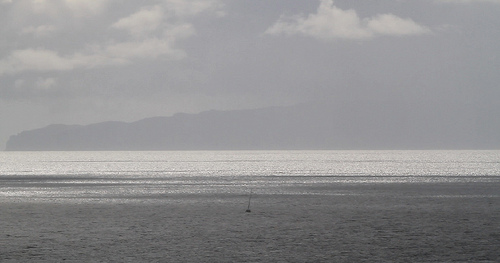
chuva
2012, 8 min
Music : Samuel André
Music : Samuel André
It is raining over the sea, the rain is coming from the side and gradually grower denser. The raindrops make the picture unclear. Behind the music, we constantly hear the sound of the downpour. Sometimes it relents, only to gain in strength again. The light eats a bright spot into the clouds. All of a sudden, the image cuts itself free from reality; waves are created by the picture’s disintegration into surfaces of changing hues that clear up into a blue colour that grows increasingly saturated. The rain on the soundtrack has stopped altogether.
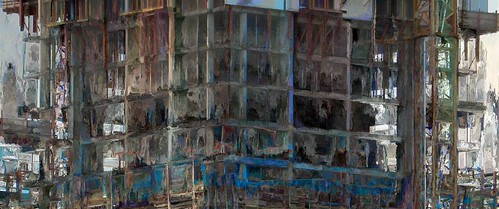
SileSilence
2021, 15 min, French with English subtitles
Music : Julien Desprez
Voices : Myriem Bayad & Jacques Perconte
Music : Julien Desprez
Voices : Myriem Bayad & Jacques Perconte
Whereas most of Perconte’s films explore the natural world, here we are travelling through an urban landscape in Rotterdam. Starting off from a window, during a rainy night, the film takes us to an industrial port, along with its smoky machines, its metallic straight lines and tall towers. Reds are strident and intense, blue-greens overflow and the horizon at first is absent. All this evokes human activities but the slow camera movements reveal no-one, until looking way above the buildings, birds take over and seem to guide the camera.
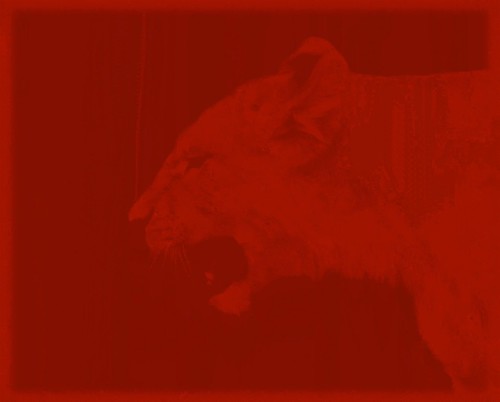
Salammbô
2021, 38 min, French with English subtitles
Music: Othman Louati
Voice: Julien Ribeill.
Music: Othman Louati
Voice: Julien Ribeill.
Commissioned for the bicentenary of Gustave Flaubert, Salammbô, is a collaboration between Perconte and the musican Othman Louati. Filmed in different places in Normandy (Flaubert’s region), each section was performed live and the music recorded in situ, before becoming a film. Flaubert’s well-known text conveys a lot of meaning, but, as Perconte says ‘it is not an adaptation’. Red is spilling all over, yellow seems to obstruct our vision at times, and we never expect what will come next. Vegetation and animals appear here and there, responding to the meticulous but also dramatic descriptions of the text. Sounds and movements take us in an infinite variation and finally leave us with a poignant sensation of disorder, a sort of apparent stillness after the chaos.
Jacques Perconte: ‘Looking for my cinema’
Jacques Perconte will introduce his work, his methods, the way he approaches each film and his main preoccupations at the moment. He will present some clips of past and on-going projects.
#2 Jacques Perconte, digital landscapes
11 June, close-up cinema
Saturday 14:00—18:30
97 Sclater Street, London E1 6hr
→ £6.00 - £12.00: book
97 Sclater Street, London E1 6hr
→ £6.00 - £12.00: book
The screening will be followed by a Q&A with Jacques Perconte, Fred Brayard, Joel McKim and Muriel Tinel-Temple
This programme focusses on landscapes and the way Perconte engages with territories. Coming back to the same places and filming over and over again is part of Perconte’s approach: each of the films presented in this screening is part of a series and is inscribed in a wider gesture of what could be called “performing landscapes”. From the golden and then grey Scottish sky to the cold Mont-Blanc mountain and the calm and majestic of island of Madeira, we travel into a digital flow of colours and forms where nature, culture and representation intertwine.
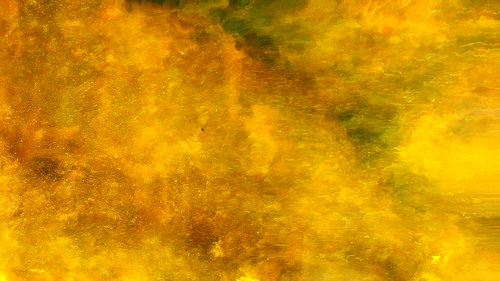
Or / Or, Hawick
Jacques Perconte, 2018, 10 min
Presented by Fred Brayard
Filmed at Hawick on 4 May 2018, Or / Or Hawick celebrates the digital fusion of a Scottish sky and a detail of Gustav Klimt’s painting The Kiss. The encounter of the gold (‘or’, in French) of the painting with birds, clouds, insects, winds, and digital compression creates a multiplicity that engages in a shared becoming. In this digital ecosystem, every detail can affect and be affected, create movement, colours, time and difference. Art, culture, nature, technology, life and matter are neither distinctive nor exclusive and any aspect of their expression is acknowledged, empowered, and granted with the possibility to participate in the process of making.
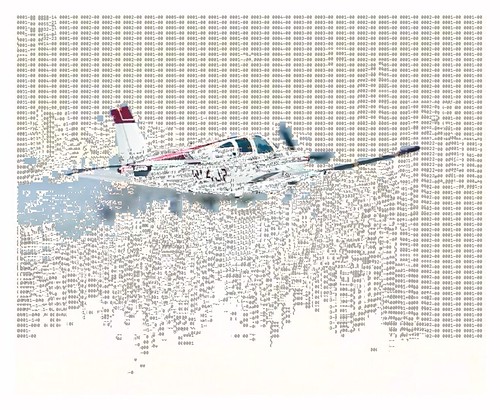
Avant l’effondrement du Mont-Blanc
Jacques Perconte, 2020, 16 min
Presented by Jacques Perconte
The film is dedicated to the eponymous Mont-Blanc and mainly filmed from a plane. We are in the middle of the mountain and its glaciers, witnessing the way they are dangerously melting, faster and faster. There is an emergency in this film: being able to fly over the mountain one last time, and the diagonal lines, the blocks of snow rolling over, the camera movements, and the sound all evoke something that is falling. Working against the idea of a drone film with perfect digital definition, Perconte pushes the media and its ‘accidents’ to inscribe digital aesthetics in media archaeology: continuing photography (the film starts with a photograph by Ruskin) but also intaglio and other etching techniques.
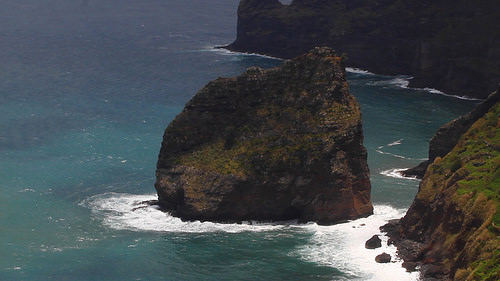
M (Madeira)
Jacques Perconte, 2014, 30 min
Off the Northwest coast of Africa Madeira, is a volcanic island, arising from the Ocean, so the film starts and finishes with the sea: blue, in movement, and all around. The film then explores the territory, the trees, the valley, the wind, and the incomparable red of the earth. As opposed to the camera movements in Avant l’effondrement du Mont-Blanc, here Perconte stays at a distance, as if not to disturb. The colours are melting, remodelling the landscape, and gestures are repeated, superimposed, sometimes far away, sometimes enlarged, playing with our perception: images are turned over, the same way the soil is prepared for planting.
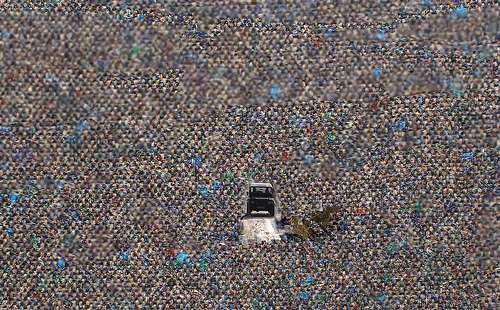
Ettrick
Jacques Perconte, 2015, 57 min
Presented by Muriel Tinel-Temple
Made over the course of several visits to the Scottish Borders, Ettrick might be one of Perconte’s most narrative films (along with Impressions, 2012). Here the harsh landscapes of forest, meadows and windmills interlace with the activity and expertise of sheep farming and wool-manufacture. Entering this territory takes time and effort, as the first moment of the film shows. Not only are we slowly following the path, but also Perconte uses of direct sound to anchor the reality of the land. As we observe factories and hands working, colours and shapes are shifting into tartan patterns and vice et versa. Time is important here, as is the weather, which forms the palette and light outlining the ever-changing horizons over the fields.
Notes on speakers:

Frédéric Brayard is lecturer in French and French studies at Uclan. His research focuses on contemporary French film and philosophy, and he is currently working on a monograph Film after Nature in which he explores the work of experimental film makers and video artists who engage with alternative digital ecosystems. /div>



Joel McKim is senior lecturer in Digital Media at Birkbeck, University of London. His research focus on the study of digital images and the impact of digital technologies on architecture, art and design. He’s the director of the Vasari Research Centre for Art and Technology.

Muriel Tinel-Temple is associate lecturer in Film Studies at Roehampton University and Birkbeck, University of London. With a background in Arts History, her research focus on experimental cinema and artists’ moving images, especially works with reflexive and self-reflexive approaches.




